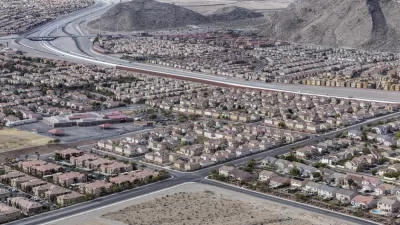If projections about remote work hold true, the resulting migration could shift economic centers, disperse housing market pressures, and transform the politics of small communities.

The lasting impact of remote work could alter the shape and character of U.S. communities, according to a piece by Jerusalem Demsas, as workers loosen their ties to physical offices and the power of economic clusters becomes dispersed across wider geographic areas.
As households with the means to relocate move to smaller, more affordable communities, they create new clusters of opportunities for businesses and services in their new homes. But the size of this shift will depend on how many companies decide remote work works for them. "For remote work to delink where people live from where they work, it’s likely not enough for just one biotech firm to decide its employees can work from home full time. A bunch of firms in that industry would need to make that shift," explains Demsas.
If predictions that 20 percent or so of American jobs will go remote holds true, it could lead to significant changes in how and where people live and work. As we've seen, the pandemic accelerated sharp spikes in housing costs in an already constrained housing market. "And while there has been some progress in recent years — notably on the West Coast — as of May 2021, the country has a shortage of about 3.8 million homes, with the problem concentrated in the metropolitan regions with the most valuable labor markets." Remote work could alleviate pressure on the housing market in these cities, spread out demand, and reduce prices in urban cores while raising costs in peripheral areas.
Reduced density, meanwhile, could have a negative impact on the climate. Even if people work fully remotely, many suburban and rural areas lack the walkability and public transit that makes car-free life possible in some major cities. Mitigating the effects of sprawl requires a reimagining of the suburbs as more mixed-use, walkable, and transit-oriented.
Further, Demsas writes that widespread remote work could also alter the political landscape of the U.S., where political leanings are currently closely tied to the density of the voter's home city. Demographic shifts could change the balance of voters in communities large and small, while housing pressures and cultural change could lead to tensions between longtime residents and newcomers.
Policymakers can help: "Localities have the opportunity to reduce the economic costs of newcomers and preemptively bring down the temperature by liberalizing their zoning laws and investing in market rate and affordable housing as well as enacting anti-displacement measures in order to reduce the conflict." By investing in local infrastructure, ensuring equitable access to job opportunities and housing, and improving public amenities, governments can help make the transition less shocking and more equitable.
FULL STORY: 3 ways remote work could remake America

Planetizen Federal Action Tracker
A weekly monitor of how Trump’s orders and actions are impacting planners and planning in America.

Restaurant Patios Were a Pandemic Win — Why Were They so Hard to Keep?
Social distancing requirements and changes in travel patterns prompted cities to pilot new uses for street and sidewalk space. Then it got complicated.

Map: Where Senate Republicans Want to Sell Your Public Lands
For public land advocates, the Senate Republicans’ proposal to sell millions of acres of public land in the West is “the biggest fight of their careers.”

Maui's Vacation Rental Debate Turns Ugly
Verbal attacks, misinformation campaigns and fistfights plague a high-stakes debate to convert thousands of vacation rentals into long-term housing.

San Francisco Suspends Traffic Calming Amidst Record Deaths
Citing “a challenging fiscal landscape,” the city will cease the program on the heels of 42 traffic deaths, including 24 pedestrians.

California Homeless Arrests, Citations Spike After Ruling
An investigation reveals that anti-homeless actions increased up to 500% after Grants Pass v. Johnson — even in cities claiming no policy change.
Urban Design for Planners 1: Software Tools
This six-course series explores essential urban design concepts using open source software and equips planners with the tools they need to participate fully in the urban design process.
Planning for Universal Design
Learn the tools for implementing Universal Design in planning regulations.
Heyer Gruel & Associates PA
JM Goldson LLC
Custer County Colorado
City of Camden Redevelopment Agency
City of Astoria
Transportation Research & Education Center (TREC) at Portland State University
Camden Redevelopment Agency
City of Claremont
Municipality of Princeton (NJ)





























